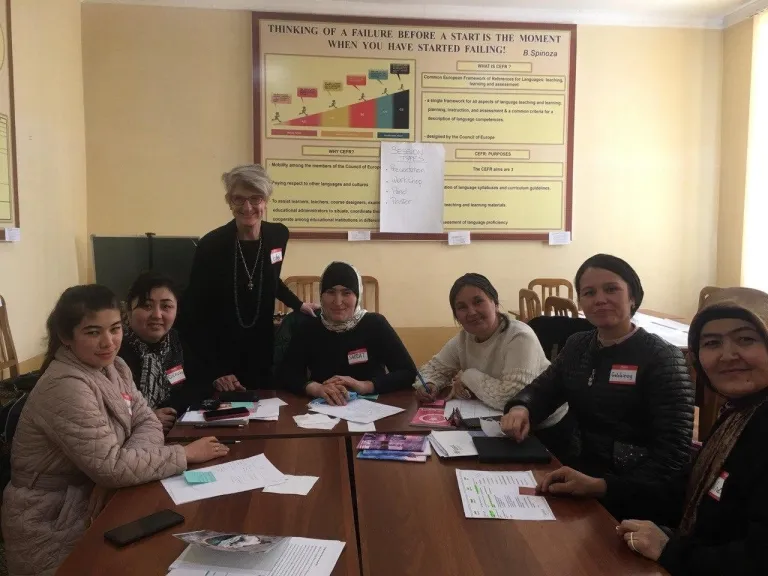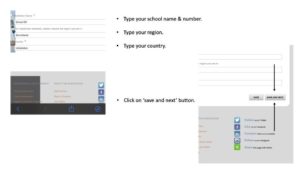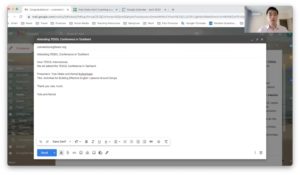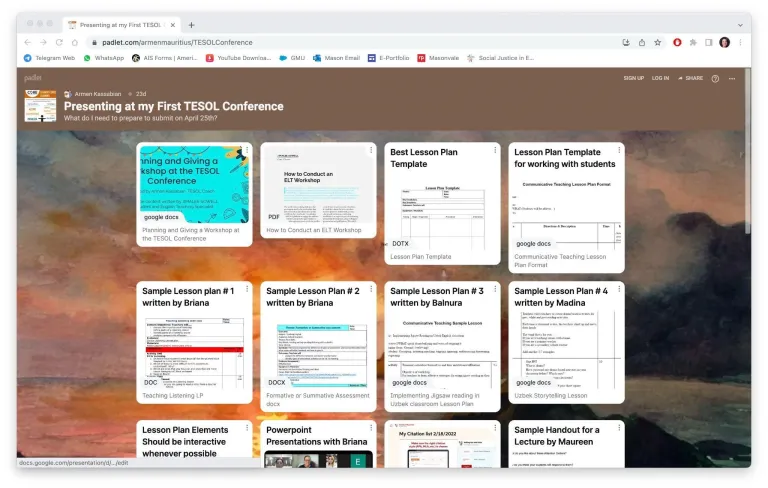Scaffolding PD in Uzbekistan: Conference Proposals and Presentations
This post is part of a series on Scaffolding professional development (PD) in Uzbekistan as part of the English Speaking Nation (ESN) Secondary Teacher Training Program. You can read an overview of the program here.
ESN participants shared their professional insights at a TESOL Regional Conference in Tashkent, Uzbekistan from 13–16 June 2022. This was the first time many of the teachers have presented at an international conference. To assist ESN participants in developing successful proposals and presentations, ESN and TESOL coaches working throughout Uzbekistan scaffolded the steps for presenting at a conference: choosing a topic and session type, writing a proposal, creating conference materials, and preparing to present.
This blog describes the following:
- information meet-ups on choosing presentation content and session type;
- how-to resources for accessing relevant websites, using Google Drive, and citing academic journals;
- brainstorming and feedback meetings about proposal formats and conference materials; and
- practice presentation workshops to boost confidence and ensure preparedness.
Choosing a Topic and Session Type
When the TESOL Regional Conference was announced in February, ESN participants were excited for the opportunity to present. However, this TESOL conference has a different structure from a traditional Uzbek conference. Because of this, some participants weren’t sure what topic they should present or which type of session would be best for presenting that topic.
To support participants in selecting a topic and session type, coaches held online and in-person meetings. Participants were encouraged to reflect on their own teaching practice to choose a topic. They were asked to consider which techniques, methods, or activities from their ESN experience were most beneficial in their educational context and which would be most helpful to other Uzbek teachers.

Coach Jode Brexa supports Andijan ESN participants as they write conference proposals.
After encouraging this reflection, coaches described each session type and provided visual examples. ESN participants with international presentation experience also gave their advice. Nargiza Ravshanova of Zarafshan advised first-time participants to do poster presentations and observe other sessions to see how they were designed and delivered. At the end of the meeting, participants were asked to consider the topic they chose and which session type would be best for sharing their ideas about the topic.
Writing Conference Proposals
Throughout February, coaches continued to support teachers through their proposal writing process by sharing resources through in-person gatherings, Zoom meetings, and Telegram. Shared resources included the article “How to Write an ELT Conference Abstract,” a PowerPoint on writing successful proposals from the TESOL website, and an instructional video on citing websites. Both Botir Khakimov from Surkhandarya and Sevara Tashpulatova from Jizzakh appreciated being part of a Telegram group where they could easily ask clarification questions about the requirements for their posters and presentations. Coaches also created a screenshot guide about accessing the TESOL website with a mobile phone to submit proposals.

Screenshot of the TESOL website when submitting proposals with a mobile phone
Along with sharing resources, coaches were available to give feedback on proposal drafts. Feedback focused on clarifying workshop steps, citing sources, and writing descriptions of how conference attendees can apply the content of ESN teachers’ presentations to their educational contexts. Dilshod Sobirov from Fergana was grateful for the specific feedback he received on how to improve his poster, while Nargiza Uralova from Kashkadarya valued the detailed feedback she received on the content and academic citations within her presentation.
Creating Presentation Materials and Preparing to Present
In April, TESOL sent out proposal acceptance notifications. Because of the educational and governmental context within Uzbekistan, those accepted were required to confirm their attendance to the conference and submit their materials via Google Drive to the Ministry of Public Education. Coaches supported ESN educators by creating a step-by-step video guide on writing an email confirmation and navigating Google Drive to upload their materials. Lobar Musoyeva of Navoi appreciated the help she received while submitting her proposal.

Coach Yuta Otake's video explaining how to write an email to confirm presenters' attendance.
As well, an article about “How to Conduct an ELT Workshop,” a PowerPoint about presentation skills, and an example of a workshop handout were shared with teachers via Telegram groups and collected on a Padlet. Coaches also hosted Zoom meetings to demonstrate how to create PowerPoints for presentations.
 Coach Armen Kassabian’s Padlet with conference presentation resources.
Coach Armen Kassabian’s Padlet with conference presentation resources.
Additionally, coaches conducted check-ins to answer presentation questions while visiting participants during ESN’s weekly teacher-training workshops. These 4-hour teacher-trainings are helpful in preparing participants to present at the TESOL conference. For example, participants must prepare their activities and materials in advance, have a backup plan if the electricity isn’t working, and incorporate their fellow teachers’ experiences, ideas, and contexts into their trainings.
In May and June, coaches held workshops with participants to practice presentations, give useful feedback, and boost confidence levels. Coaches traveled to sites from Andijan to Zarafshan to ensure every ESN presenter is prepared to contribute to an English Speaking Nation through the TESOL Regional Conference in Tashkent! Some groups even held a mini-conference to include local teachers who could not attend as practice for the event.
Personalizing Learning
As teachers share their learning with others, we wanted to reflect on how they personalized their learning from international organizations like TESOL and George Mason University. In our next blog, read more about how core trainers adapted and applied their learning for their own contexts, coming soon!

